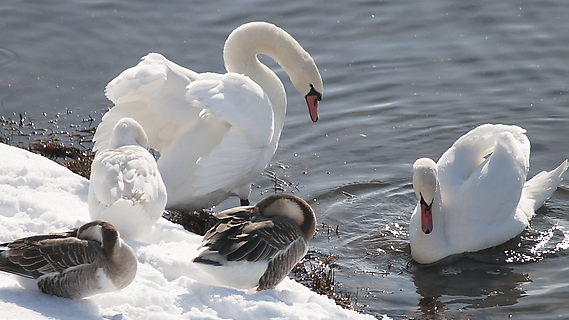After a while, Mr. Brickle rose to his feet and addressed the boys and the counselors.
過(guò)了一會(huì)兒,布里克先生站起來(lái)對(duì)男孩和輔導(dǎo)員們發(fā)表演說(shuō)了。
"I call your attention," he said, "to a new camper in our midst--Louis the Swan.
“我要提請(qǐng)大家注意,”他說(shuō),“我們中間有一個(gè)新?tīng)I(yíng)員--天鵝路易斯。
He is a Trumpeter Swan, a rare bird. We are lucky to have him.
他是一只號(hào)手天鵝,一只珍禽。有他在此是我們的幸運(yùn)。
I have employed him at the same salary I pay my junior counselors:
我給他的薪水和我給少年輔導(dǎo)員的一樣多:
one hundred dollars for the season.
一夏天一百美元。
He is gentle and has a speech defect.
他性情溫和,只是不能發(fā)聲而已。
He came here from Montana with Sam Beaver.
他是從蒙大拿和薩姆比弗一起來(lái)的。
Louis is a musician.
路易斯是個(gè)音樂(lè)家。
Like most musicians, he is in need of money.
像多數(shù)音樂(lè)家一樣,他也正急需用錢呢。

He will wake you at daybreak with his trumpet;
他將在黎明用他的小號(hào)叫醒你們;
he will call you to meals;
他將召喚你們吃飯;
and at night, when you are dropping off to sleep, he will play taps, and that will bring the day to a close.
在夜里,當(dāng)你們就要入睡時(shí),他將給你們吹熄燈號(hào),那就表示這一天結(jié)束了。
I caution you to treat him as an equal and to treat him with respect
我警告你們,一定要平等地待他,對(duì)他尊重些
he packs a terrific wallop with one of those wings.
他隨便用哪只翅膀都能把你們猛揍一頓。
I now introduce, for your listening pleasure, Louis the Swan.
為了讓你們大飽耳福,我現(xiàn)在就向你們介紹天鵝路易斯。
Take a bow, Louis!" Louis was embarrassed, but he came forward and bowed.
鞠個(gè)躬,路易斯!” 路易斯很不好意思,可他還是走上前鞠了個(gè)躬。
Then he raised his trumpet to his mouth and blew a long ko.
然后他把他的小號(hào)舉到嘴邊吹了長(zhǎng)長(zhǎng)的一聲“吭”。
When he finished, from the opposite shore of the lake there came the echo: ko-oo.
他剛吹完,湖岸對(duì)面就傳來(lái)了回聲:“吭—吭”。
The boys clapped.
男孩子們鼓起掌來(lái)。
Louis bowed again.
路易斯又鞠了一躬。
Sam Beaver, sitting with the others, his mouth full of marshmallows, was delighted that his plan had succeeded.
薩姆·比弗正和其他人坐在一起,嘴里滿是果汁軟糖,為他的計(jì)劃能夠?qū)崿F(xiàn)而暗自開(kāi)心。
At the end of the summer, Louis would have a hundred dollars.
等這個(gè)夏天結(jié)束,路易斯就能掙一百美元了。
A boy named Applegate Skinner stood up.
一個(gè)叫阿普爾蓋特·斯金納的男孩站了起來(lái)。
"Mr. Brickle," he said, "what about me? I don't care for birds. I've never liked birds."
“布里克先生,”他說(shuō),“我怎么辦?我討厭鳥(niǎo)類。我從來(lái)就不喜歡鳥(niǎo)兒。”
"Ok., Applegate," said Mr. Brickle.
“OK,阿普爾蓋特,”布里克先生說(shuō)。
"You don't have to like birds.
“你不必去喜歡鳥(niǎo)兒。
If that's the way you feel about it, just go ahead not-liking birds.
如果你這么覺(jué)得,就繼續(xù)討厭鳥(niǎo)類好了。
Everyone is entitled to his likes and dislikes and to his prejudices.
每個(gè)人都有權(quán)喜歡或不喜歡什么,都有權(quán)保留自己的成見(jiàn)。
Come to think of it, I don't care for pistachio ice cream.
讓我們來(lái)想想,我不喜歡吃開(kāi)心果冰淇淋。
I don't know why I don't like it, but I don't.
我不知道我為什么不喜歡它,可我就是不喜歡。
Do not forget, however, that Louis is one of your counselors.
不過(guò)可別忘了,不管怎么說(shuō),路易斯都是你的輔導(dǎo)員之一。
Whether you like him or not, he must be treated with respect."
不管你喜不喜歡他,他都必須得到尊重。”



